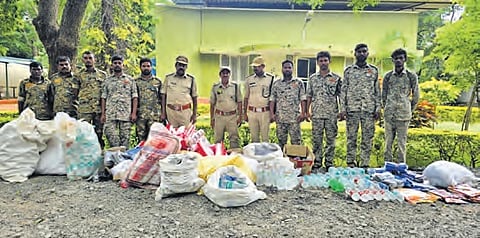

KURNOOL: Forest officials in Nallamala are intensifying efforts to eliminate plastic waste from the region, focusing on a strict ban on single-use plastics.
A task force comprising forest department staff, revenue officers, police, and endowment department personnel has been formed to enforce this ban. Violators will face fines of Rs 2,000 for the first offense and Rs 5,000 for subsequent offenses, according to T Sai Baba, the Deputy Director of Nagarjunasagar-Srisailam Tiger Reserve (NSTR) and Atmakur Division Forest Officer.
The Joint Vigilance and Enforcement Team is overseeing the implementation of the plastic ban in Srisailam, Sunnipenta, and NSTR. Plans are underway to promote cloth and paper bags as alternatives to plastic, providing income-generating opportunities for local tribals through NGOs. Additionally, the temple authorities are relocating the dump yard outside NSTR.
A three-year action plan under the ‘Green Pilgrimage’ theme includes deploying screening teams at entry points of pilgrim paths to collect plastic items and replace them with alternatives like cloth bags and reusable water bottles. Entry fees will support eco-development measures, and drinking water and food provisions will be available at designated locations. Shops will be confined to designated areas, prohibiting the sale of plastic water bottles and other single-use plastics. Temporary waste collection bins will be placed strategically along pathways.
NSTR, spanning 3,727.50 sq km in the Nallamala Ranges, is India’s largest tiger reserve. The reserve comprises four divisions: Atmakur, Markapur, Nandyal, and Giddalur, under the unified control of Project Tiger Circle. The forest floor along major roads and pilgrimage centres is littered with single-use plastics, posing a threat to wildlife and degrading the environment. To address this, NSTR employs 90 local tribal men year-round to collect and dispose of plastic waste.
Key roads passing through NSTR, including Doranala to Srisailam (50 km), Atmakur to Dornala (60 km), and Nandyal to Giddalur (40 km), as well as the 40 km pilgrim path from Venkatapuram to Srisailam, are frequently littered with plastic waste, especially during festival seasons. The plastic waste in core areas disrupts wildlife habitats and alters animal behaviour. The National Tiger Conservation Authority has mandated that all tiger reserves be plastic-free zones, and the State government has formed a committee to address plastic waste and man-animal conflicts in NSTR.
Recent cleanup efforts include removing approximately 8 lakh water bottles and five truckloads of chappals from pilgrim pathways. Bhimuni Kolanu, previously littered with plastic and garbage, has been cleaned. Swacha Sewaks, engaged by NSTR through the Tiger Conservation Foundation, conduct regular plastic removal drives. A Swacha Nilayam has been established at Sunnipenta for collecting and storing plastic waste.
Local dealers and retailers in Sunnipenta and Srisailam are transitioning to glass water bottles.
The Srisailam temple authority plans to set up a glass water bottle plant and increase the number of RO plants from 37 to 42. Customised dustbins and a plastic waste bailing unit have been installed to manage waste effectively.